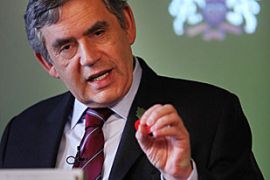Britain crawls out of recession
Growth of 0.1 per cent in fourth quarter sees UK emerge from longest recession since 1955.

‘Snail’s pace’
The positive expansion, which undershot expectations of a 0.4 per cent rise, marked the end of a recession that began in the second quarter of 2008 as a result of the global financial crisis.
Britain’s return to growth means that Spain is the only major economy still trapped in recession.
|
“Never has an end to a recession been so underwhelming” Colin Ellis, |
But the outlook for the global economy is far from rosy, with the International Monetary Fund and the United Nations recently warning of a possible renewed or “double-dip” recession this year.
Those worries are mounting in Europe, where Greece and Portugal are also struggling with soaring public debt.
Like many Western countries, Britain’s public debt has rocketed to record levels as the government spent billions of pounds on financial stimulus measures and banking-sector bailouts in an attempt to avert economic meltdown.
Last week, unemployment in the UK fell for the first time in 18 months but still remains high at about 2.5 million.
“The UK economy finally exited recession in the fourth quarter last year, but at a snail’s pace,” Jonathan Loynes, an economist at consultancy Capital Economics, said.
“With households under pressure, credit in short supply and a fiscal squeeze looming, the path back to pre-recession levels of activity will be a long and bumpy one.”
Figures ‘skewed’
Commentators also argued that the return to economic growth was skewed because temporary factors had lifted GDP – the total value of goods and services produced in an economy – particularly in the retail and car sectors.
Retailers won a major boost from a temporary cut in taxation on goods and services in December 2008 when value-added tax (VAT) was trimmed for one year to help lift Britain out of recession.
The motor trade has also been energised by the government’s scrappage scheme that subsidises the cost of buying a new car if trading in an old model.
“These sectors will have been boosted by the pre-announced VAT rise in January, and the car scrappage scheme, suggesting that, on an underlying basis, the economy only stagnated at best,” Colin Ellis, an economist at Daiwa Capital Markets, said.
“Never has an end to a recession been so underwhelming,” he said.
The ONS also announced that the British economy shrank by 4.8 per cent over the course of 2009, compared with the previous year – the biggest annual contraction on record.
State borrowing is meanwhile predicted to strike a record $288bn in the 2009/10 financial year which ends in April.